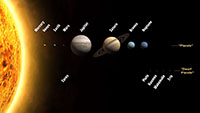Pluto


The planet Pluto was first discovered in 1930, when it was recognized as the ninth planet of the solar system. However, it differs from the other planets in a number of ways. It has an orbit that is in a different plane, and the orbit is eccentric, with portions inside the orbit of Neptune. It is only slightly larger than the Moon, and its mass is roughly 0.2% of the mass of Earth. These facts, along with the discovery of other similar objects outside the orbit of Neptune, led to the International Astronomical Union in 2006 changing the definition of a planet to exclude Pluto.
Many astronomers, however, continue to consider Pluto and other dwarf planets to be planets. Astrologers also consider Pluto to be one of the planets.
The planet Pluto is an outpost of the Black Central Sun in our solar system.
Greek mythology
In Greek mythology, Pluto was the god of the underworld. He was the son of Cronus, a Titan identified by the Romans as Saturn, and Rhea, another Titan. Titans are very powerful fallen ones who exercise the abuse of power.
Pluto’s oldest name is Hades, which means “the Unseen,” the underworld, or the infernal region. This is the home of the dead beneath the earth. The gates of the underworld were guarded by Cerberus, a three-headed dog who prevented souls from ever leaving. Heroes and virtuous people went either to the Elysian Fields or to eternal life in the Isles of the Blessed where the golden age was recreated.
Pluto, who ruled the underworld with his wife, Persephone, was an inexorable god, hated and feared by gods and men. According to myth, he goaded unwilling souls into his realm with a pitchfork.
Later popular ideas about his character underwent a remarkable transformation. Instead of a life-hating god of death, he became a god of abundance. Pluto in fact means “giver of wealth.” Pluto’s association with wealth is the basis of the word “plutocrat”—one who wields great power and abuses that power to obtain wealth and conversely one who obtains power through wealth. So a plutocrat is one of wealth who is an abuser of power, and we have many in our society today.
In astrology
Although many astrologers believe Pluto’s vibration has a positive, regenerative side, it is undeniably associated with death, and its influence is often highly destructive. Among other things, it rules the radioactive element plutonium.
In all branches of astrology, Pluto is associated with cataclysmic events, such as the onset of wars and the fall and/or death of rulers. It rules all things secretive and the instinct for self-destruction. In mundane astrology—the astrology of nations and world events—Pluto rules nuclear power, fires, waste disposal, and anything involving widespread death and destruction. It also rules the radioactive element plutonium.
Pluto tends to deny or destroy an individual’s highest expression in the sign, planet, and house where it appears by birth, progression or transit.
Pluto transits
In mundane astrology, transits of Pluto in hard aspect to the natal Sun or other important planets are often associated with the outbreak of wars. If nations do not go to war, they face challenges as severe or nearly as severe as war. These could include financial problems, nuclear power accidents, power struggles, civil unrest, terrorism, and a challenge to the government’s grip on power.
For example, Pluto was transiting across the U.S. natal Sun at 10° Taurus during the American Civil War (1861–65). As the war began on April 12, 1861, Pluto was at 8° Taurus. By the war’s end on April 9, 1865, it had crossed to 12° Taurus. It is difficult to imagine a more serious national challenge than the Civil War; it could easily have resulted in the end of the United States of America had it not been for enlightened leadership.
Transiting Pluto was conjoined the natal Sun of the Soviet Union from January 1988 and October 1991, a period which coincided with the break-up of the Soviet Union.
Since Pluto is a slow-moving planet that takes 248 years to orbit the Sun, the effect of a Pluto conjunction can take anywhere from a few months to several years to appear.
Rulership
In natal astrology, Pluto rules
- regeneration
- transformation
- renewal
- destruction
- manipulation, denial, coercion, annihilation.
In mundane astrology, Pluto rules
- the abuse of power in all forms
- all things hidden and secret
- widespread death and destruction especially from war, nuclear energy, toxic substances
- power struggles
- terrorism
- totalitarian states
- spy organizations
- tyrants
- secret police
- organized crime
- self-destructive activities
- destructive forces outside of one’s control such as war, natural catastrophes, depressions, and nuclear accidents
Sources
Astronomical information compiled by the editors.
Elizabeth Clare Prophet, July 30, 1989.
Elizabeth Clare Prophet, The Astrology of the Four Horsemen, Glossary of Astrological Terms.
Elizabeth Clare Prophet, Saint Germain On Prophecy, book 2, ch. 15.
